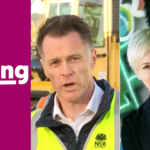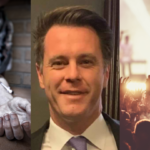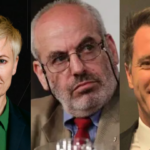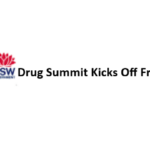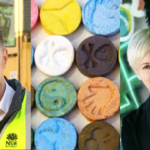NSW Drug Law Campaigners Call for Long Sought-After Illicit Substance Reforms
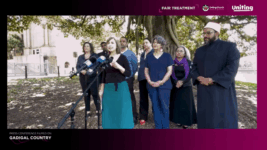
A coalition of NSW organisations led by Uniting held a presser last week calling on NSW premier Chris Minns to respond to the Report on the 2024 New South Wales Drug Summit within the six-month-period that report authors set for the government to respond to the long-sought drug law reforms they recommended, as, quite frankly, NSW Labor has been trying to avoid this since taking office.
Report authors former NSW Labor deputy premier Carmel Tebbutt and former NSW Liberal opposition leader John Brogden have placed more than 50 drug law reform recommendations on the table for the government to consider in response to the four-day-long drug summit that took place over November and December in 2024.
The final day to respond within the six months is Friday 3 October 2025. The fact that Uniting and other respected organisations considered they had to hold a press conference to call for action on the reforms is no surprise, however, as the premier promised drug law reforms, including to hold a drug summit, prior to taking office and then attempted to drop the issue following election.
Uniting runs the Fair Treatment campaign, which calls for drug decriminalisation in NSW. On its 2018 establishment, it had called upon the ACT to implement the same. The ACT did this in October 2023. And as Canberra was embarking on this change, the Murdoch press pushed Minns on the issue, and he responded that he had “no mandate” for such a reform, and he cast doubt over any summit.
After battling the Coalition dinosaurs on Macquarie Street for over decade in respect of legislating reforms, the now war-weary NSW drug law reforming campaign has found that a supposedly reformist-minded NSW Labor Party lied through its teeth in the leadup to the March 2023 election, as no promised drug law reforms have been forthcoming.
Last week’s press conference, however, shows that the long-term NSW campaigners for drug law reform are not going to bow down.
“Like sand through the hourglass”
“It’s been 175 days since the government was handed the Drug Summit Report – the entire sector and the community have extremely high expectations of the government’s response and its implementation of the recommendations,” said Uniting Church NSW.ACT director of advocacy and external relations Emma Maiden.
“Time’s nearly up on this premier.”
The well-respected 2024 NSW Drug Summit cochairs Tebbutt and Brogden made 56 recommendations in their 3 April report. These included ending sniffer dog and strip search use at music festivals, allowing for more medically supervised injecting centres, enacting a drug driving defence for users of legal medicinal cannabis and the continued roll out of pill testing.
But the premier and health minister Ryan Park announced at the start of the Sydney-leg of the 2024 NSW Drug Summit that the key reform that’s understood would be of most benefit to civilians with problematic drug use, decriminalisation, was not to be contemplated. This came after the promised summit was held in a disjointed manner that many thought was intentionally designed to fail.
“The Drug Summit Report recommends… improvements to existing systems to divert more people to a health response for their drug use,” Maiden continued. “The community expects… these reforms alongside a whole-of-government alcohol and other drugs (AOD) strategy and more access and funding for vitally needed treatment services, particularly in regional and rural NSW.”
The director of advocacy for the progressive Christian Church further underscored that there are 96 words within the Drug Misuse and Trafficking Act 1985 (NSW) that if the government removed would have the potential to save countless lives as it would allow for the establishment of further safe injecting rooms, like the Uniting Medically Supervised Injecting Centre (MSIC) Kings Cross.
Maiden adds that over the last six months, 250 people have died from drug overdoses in NSW, however none of them died at the Kings Cross safe injecting room. Indeed, the Uniting MSIC has successfully managed over 11,500 overdoses without any deaths, since it opened in 2001.
Ultraconservatives stall progressives
Along with Maiden, Uniting MSIC medical director Dr Marianne Jauncey, advocacy group Live Experience spokesperson Lorena, Australian National Imams Council member Mahmoud Alazhari and Bardi man and Sydney Medical School Associate Professor Michael Doyle, all addressed the press on 24 September. The press release notes that NUAA and the Wayside Chapel supported their calls.
The premier ruled out drug decriminalisation and too delayed the holding of a drug summit into the future in August 2023, as NSW MLC Cate Faehrmann, whose long been introducing drug law reform bills into parliament, told Sydney Criminal Lawyers that Minns had been clear that he would be progressing a drug summit on being elected.
The Carr Labor government held the 1999 NSW Drug Summit, which marked a significant shift in the approach of an Australian government to the issue of illegal drug use in the community, as it rejected the zero tolerance approach to drug use, and led to the establishment of the Kings Cross MSIC: the first safe injecting centre in the English-speaking world.
Decriminalisation for NSW would mean that the criminal penalties against personal drug possession and drug use would be removed so that individuals either face a small fine or have to undergo a drug counselling session. However, the gold standard decriminalisation model that’s been operating in Portugal since 2001, most often results in no penalty for those found in possession of an illicit drug.
As veteran NSW drug law reformist Dr Alex Wodak noted in Pearls and Irritations last December, the open secret is most of the NSW cabinet supports major drug law reform. These ministers expected reform in the lead up to the 2023 election. So, it appears that Labor ministers calling the shots in this regard are playing the conservative Coalition card, despite an internal push for sensible reform.
Literally costing lives
“Those of us that work at the frontline are calling for meaningful response to the drug summit. Tinkering about the edges is not going to cut it,” said Uniting MSIC’s Dr Jauncey last week.
“As a doctor, I can tell you, that an opiate overdose death is completely and utterly preventable. The work that I do at my centre sees that every day, and yet if we did the same thing in a different suburb of Sydney, we would all be breaking the law.”
Dr Jauncey has set out the crux of the issue here. While the majority of the NSW Labor cabinet understands that instead of punishing people in NSW for drug use, they could assist them with any problematic use or leave them be. Instead, the NSW government continues to have NSW police officers out on the beat, accompanied by drug dogs, hassling people over small amounts of drugs.
The NSW government is continuing with its utterly flawed zero-tolerance, “just say no” approach to drugs that has shown itself to be incapable of preventing the increasing flood of illicit substances onto the streets, and as Australian law enforcement can’t stop the drug traffickers, they tend to go after and punish the drug user, and for the most part, they like to hassle the poor drug user.
“We would be breaking your laws, premier,” Dr Jauncey continued. “There is an antiquated small clause of less than a hundred words that just needs to be crossed out. That means that communities that want to explore the benefits of a small, supervised hub would be able to do so.”
“My question is this,” said the long-term drug law reform advocate, “how many drug summits, how many special commissions of inquiries, and how many coronial inquests, is it going to take?”


